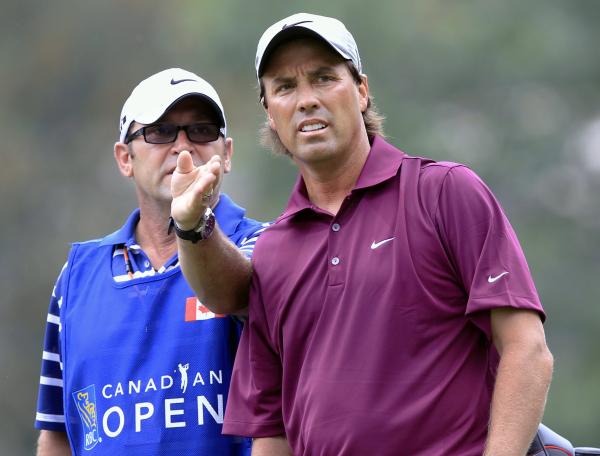
Life on the bag is challenging for any full-time professional caddy. You spend 25 to 30 weeks on the road knowing that each tournament could be your last.
The highs and lows are a part of the gig, says South Tampa resident Dean Elliott. He grew up caddying at Sunningdale Golf Club in Berkshire, England and has spent the past 20 years on the European and PGA Tours. Fortunately for Elliott, the highs have certainly outpaced the lows.
His story starts nearly 40 years ago in the suburbs of London. Elliott, 52, grew up in a working-class family and took up caddying as a summer job when he was just 13 years old. He made 12 pounds a week carrying clubs for wealthy golfers in Berkshire. He had a knack for the sport and was soon paired with better players at the club.
In the early 70s, England was experiencing a housing boom. Construction jobs were plenty and most of Elliott’s friends were making it big in the roofing business. Caddying was a good job, but it wasn’t paying out enough for a young man looking to have some fun. So he left golf for a job as a subcontractor at Bracknell Roofing.
“I was making triple what I was earning as a caddy,” he says.
He was in the roofing business for 11 years until the recession hit. To make ends meet, he started picking up jobs giving golf lessons at Sunningdale on the weekends. It wasn’t long before word got around that Elliott was back in the golf scene. In 1993, he got his first real break on the European Tour as the caddy for Irish golfer Eamonn Darcy. The two did quite well at the Madeira Islands Open.
After Darcy, he was on the bag for English professional golfer Ian Garbutt and then Stephen Ames, a Caribbean golfer from Trinidad and Tobago. Ames had his wife caddying for him. She couldn’t make the Open Grand Lyon and Elliott’s player wasn’t working. Ames called him up and asked him to get to France.
Elliott’s brother was caddying for Gabriel Hjertstedt that week as well. So the two spent 10 pounds on a car that they drove to the port and into Lyon. That weekend, Ames and Elliott won the tournament and the 40,000 pounds that came with it. Hjertstedt finished third.
“We drove the car back to the port—it was about a 200-mile drive—and the car blew up on the side of the road,” Elliott says laughing. “We just left it there and thumbed our ways back to the port. I was so happy when we got to the boat that I paid for everyone’s ticket.”
Elliott saw the rest of the year with other players, including Ames, before settling full-time with the golfer after winning the 1996 Benson & Hedges International Open.
“He shot par in the wind and a rain,” Elliott says of Ames. “That was a huge win for us.”
For the next 12 years, Ames and Elliott worked side-by-side. They participated in three Masters tournaments and won the 2007 and 2009 Children’s Miracle Network Classic.
Elliott took some time off from golf from 2003 to 2005 to work at Sunningdale. He even caddied for actor Hugh Grant during his stay in England. He also left the Tour in 2011 to be with his wife as she battled cancer. The two separated a few years ago and Elliott moved to South Tampa, where he’s still a full-time caddy. He’s currently working with Greg Chalmers from Australia. The two have already participated in more than a dozen tournaments. When we spoke recently, they were at the Phoenix Open and would soon travel to Pebble Beach and the Los Angeles Open.
Elliott has been in the United States in 1998, but he’s lived just over a year in Tampa. He’s spent the majority of his professional life on the road, but he says Tampa is where his heart lies.
“I first came to [Tampa Bay] on vacations,” he said. “I’ve been to most cities in the world, and I’m not a cultural person, but I think Tampa is the best city in the world.”
In his free time, you can find him on the tennis court, riding his road bicycle or hitting the gym. Of course he also likes to take in some of Tampa Bay’s golf courses, with Innisbrook and TPC being some of his favorites.
Being able to travel the world, compete at the highest levels in golf and live in a tropical paradise makes his life rather swell, Elliott says.
“It can be a tough schedule doing 30 tournaments a year,” he said. “But the amount of free time I have to spend with my lady makes this such an amazing profession.”